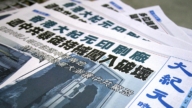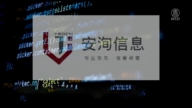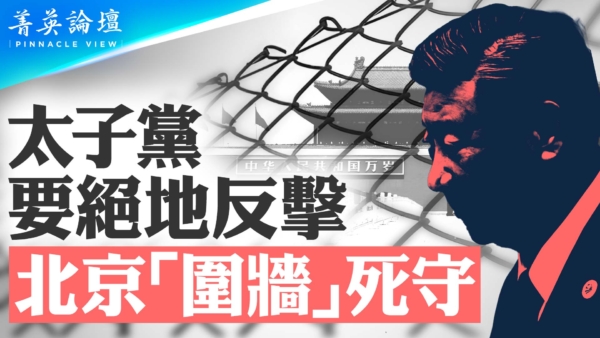【新唐人2013年08月31日訊】中共當局最近出臺了一系列對媒體管控的嚴厲舉措。其中,中宣傳部下令所有喉舌媒體記者參加馬克思主義課程,被視為是最新的一次行動。據報導,總人數超過30萬人以上。外界普遍相信,這一舉措,是當局企圖進一步收緊對傳媒的控制。
美國《華爾街日報》8月29號報導,中宣部在當月,要求中國所有的喉舌媒體人員參加至少兩天的馬克思主義課程,其中包括30多萬名記者和編輯。
報導引述香港大學的一位研究員班志遠(David Bandurski)的話說,這些課程可能著重關注馬克思主義新聞觀,指導記者要「聽黨的話」、「支持黨的路線」,幫助引導公眾輿論。相應地,媒體人員的課程重點,是提醒他們幫助維持所謂的「穩定」,以及支持中共當局。而在選擇發佈信息方面,要服從上級的領導。
班志遠透露說,這些媒體人員被告知,這是他們的任務,不能忘了。
原《陝西電視臺》編輯馬曉明:「那就是要加強對記者的思想控制,使記者服服帖帖的為他們的政治宣傳服務,為他們的愚民政策服務。在中國大陸,正式被批准成為記者的人,幾乎全部都是官方的記者。因為中國大陸既沒有獨立的黨派,就更談不上獨立的政治團體辦的報紙。」
曾經擔任中共喉舌媒體《陝西電視臺》編輯的馬曉明表示,自己就是因為沒聽中共的話,犯了所謂的「嚴重違反黨的宣傳紀律」,所以被撤銷了編輯職務。
對於中宣部的命令,班志遠告訴《華爾街日報》,這一舉措表明當局有了新的緊迫感,所以加快對記者的管制。因為在中國目前的環境下,中共的媒體通常優先取得消息發佈權,甚至獲得獨家消息和專訪,使他們可以主宰新聞的傳播。
深圳專欄政論作家朱健國觀察認為,現在中共的整個趨勢,是要回歸到文革之前的那種狀態,也就是1949年至1966年。那個時候就是堅持以馬列主義為意識形態。
深圳專欄政論作家朱健國:「這種跡象表明,所謂十八屆三中全會,要研究的改革,與真正的改革是無關的。所謂真正的改革是打破禁區、開放禁區,而現在是增加禁區、設立禁區。225這就表明現在有些人還對『習新政』還抱有幻想、希望,那是不可能的。改革早已終結了,沒有了,現在是回頭。」
最近幾個月,中共擴大對網絡信息打擊的範圍和力度。本月,中共當局還宣佈了打擊「網絡謠言」的計劃,呼籲所有網絡用戶進行自我審查,中共喉舌《人民日報》不久前也附和報導了這一消息。
朱健國:「所有信息的採集和發佈,全部由中南海把它控制起來,那就把老百姓的信息採集權、知情權都要收回。像最近打壓網絡上的那些意見領袖,網絡大V,像薛蠻子事件,那都是雞蛋裡面挑骨頭,來找事。」
《自由亞洲電臺》報導顯示,據不完全統計,最近兩個月,中國各地警方對所謂的「網路謠言製造和傳播者」,最少逮捕和刑拘了五百多人。
其中,知名博客作者薛蠻子最近因為涉嫌召妓而被拘,引發人們擔心,認為他可能是被當局陷害,因為薛蠻子經常就社會事件發表評論。
馬曉明:「它暫時可以壓制一下民間信息發佈、信息交流的勢頭,但是總的來說,它不可能壓制住。就是現在在中共政權打壓網絡信息傳播期間,民間的信息傳播仍然非常頻繁、非常火爆的傳遞中。」
今年2月,「無國界記者」 組織(Reporters Without Borders)發表的全球新聞自由排名榜上,中國在179個國家和地區中,名列第173位。報告說,中國(共)監禁社交媒體活躍用戶的情況是世界上最嚴重的。
採訪/易如 編輯/王子琦 後製/孫寧
Chinese Regime Requires Reporters to Take Marxism Lessons
Recently, a series of harsh media control measures
were issued by the Chinese Communist Party (CCP).
One is that all media reporters have to attend
Marxism classes.
Observers believe this is an action to further
control the media.
On August 29, the Wall Street Journal reported that
the Central Propaganda Department requires all media
personnel, including over 300,000 reporters and editors,
to attend at least two days of Marxism classes.
David Bandurski, a researcher at the University
of Hong Kong, said that these classes may focus on Marxist’s
news concepts, guiding reporters to listen to the party,
support the party line, and to help guide public opinion.
Accordingly, lessons for reporters may focus on maintenance
of stability, supporting the central government,
and publicizing information according to the superior
leadership.
These media personnel were told that it was their task
and should not be forgotten.
Ma Xiaoming, former editor of Shaanxi TV:
“By strengthening control of the reporters’ minds,
reporters will provide services of obscurantism.
In China, there is no independent party, let alone independent
newspaper, and all reporters are officially appointed.”
Ma Xiaoming was removed from his editor position
because he failed to follow the CCP,
committing serious violations
of propaganda discipline.
David Bandurski told the Wall Street Journal
the CCP’s move showed that
authorities had a new sense of urgency and
want to hasten control of reporters.
Currently, media outlets have priority in obtaining the
right to publish or getting exclusive news and interviews,
so they can decide how to spread the news.
Zhu Jianguo, columnist from Shenzhen, thinks this shows
the whole trend of the CCP is returning to the state before
the Cultural Revolution, from 1949 to 1966, which was
to adhere to Marxism-Leninism as the ideology.
Zhu Jianguo: “This scenario indicates that what was being
discussed during the 18th Congress had nothing to do with real reform.
The real reform is breaking through restricted areas, but they
are increasing the restricted and prohibited zones instead.
Many people still cherish the hope of Xi’s new deal.
That is an illusion; the reform is over and
now it is going backwards.”
In recent months, the CCP expanded its attack
on information, both on the scope and intensity.
This month, authorities also announced a scheme to attack
network rumors, calling on all network users to self-inspect,
and the CCP mouthpiece People’s Daily also recently
reported the announcement.
Zhu Jianguo: “Zhongnanhai controls all of
the collection and dissemination of information.
In other words, they take away the people’s right
to collect and to know about information.
For example, the recent suppression of leaders of network
information and the Xue Manzi incident—the arrest
of the VIP of microblogs—is like finding bones in eggs.”
Radio Free Asia reported that,
according to incomplete statistics,
more than 500 people were arrested for creating and
spreading rumors on the Internet in the last two months.
Among them, the well-known blog writer Xue Manzi,
was arrested for prostitution.
People are afraid that Xue was framed by authorities
because he likes to comment frequently on social events.
Ma Xiaoming: “You can temporarily suppress the momentum
of information dissemination and information exchange.
However, in general it is impossible to suppress information.
Currently, dissemination of information among masses
is still very frequent and fast.”
In February 2013, the Reporters Without Borders
organization revealed its freedom of information list,
in which China ranks 173 out of 179 countries
and territories.
It also said that China is the worst country in the world
in controlling active users of social media.































